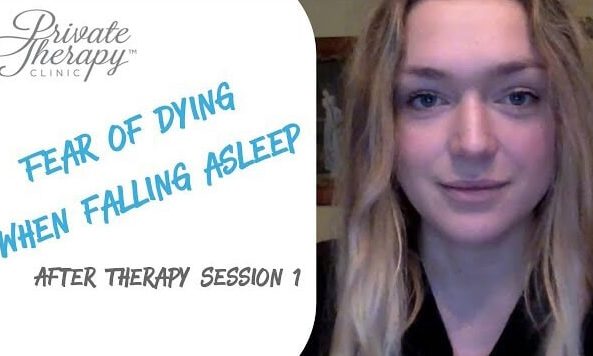Somniphobia: The Irrational Fear of Falling Asleep (The Issue and the Answer)
WHAT IS SLEEP ANXIETY?
There many different types of sleep disorder, the most well-known being insomnia, sleep apnea (snoring) and jet lag. However, not so wide-spread is the fear of falling to sleep – or in this case – the fear of dying while falling to sleep. As of yet, there is no one accepted name for the condition, as the terms somniphobia, hypnophobia, sleep anxiety and sleep phobia have all been used to describe it.
POPPY’S STORY
Recently, Poppy came to see in us in our London offices with a particularly challenging form of this sleep disorder. She’d been experiencing chronic anxiety about dying during her sleep, which was causing her to forcibly keep herself awake night after night. As you’d expect, over time, this had begun to take its toll on her physical and mental well-being. In the video above, you can listen to Poppy’s first-hand account of what it felt like to live with the condition before coming to see us.
She talks about the challenges of living with her unique form of anxiety, which led to frequent panic attacks. These episodes were the result of her actively trying to avoid drifting off to sleep, as she tells of the tendency to, ”overthink everything,” and experiencing her own thoughts, ”at a million miles an hour.” This occurred, she says during the in-between state of wakefulness when you’re neither fully cognizant nor fully asleep, known as the hypnogogic state.
The source of the fear, she recounts, is rooted in the act of falling asleep itself, as she associated the physical sensation of the body relaxing to what she imagines it would be like to die, feeling as though her body was about to give up on her. The recurrence of these thoughts eventually triggered the onset of her anxiety attacks, of which she says ”I would get shortness of breath. I start to panic and get very dizzy and disorientated […] my heart starts beating irregularly, [I get] heart publications, [feeling as though] it’s coming out of my chest.”
WHAT WAS THE OUTCOME?
After having only 7 Cognitive Behavioural Therapy (CBT) sessions with one of our resident Psychologists, Dr Daniela Rossi, Poppy was able to overcome her fear and return to her normal sleeping patterns without a reoccurrence of the problem. Although, her anxiety was unorthodox in nature, it was still very much a behavioural issue and therefore responded extremely positively to cognitive behavioural therapy.
If you’re unaware of how CBT works, it is a form of psychotherapy that combines both an emotional and behavioural approach. It take a pro-active approach that encourages you to overcome your fears by exposing yourself to them in a controlled manner. As your capacity to tolerate these ‘stress situations’ increases, along with the guidance of your Therapist, you’llcontinue to push the edge of your comfort zone with incremental challenges until the anxiety you’re experiencing is no longer affecting you. You can find more information on CBT by clicking here.
In the first video above Poppy talks about her first session with Dr Daniela Rossi at Private Therapy Clinic. Poppy has come to therapy to treat her anxiety disorder which was a fear of dying while falling asleep. Poppy is offered CBT to help her overcome her fear. This video discusses what happens in Poppys first session (the assessment session).
Video Transcript
“Hi. I’ll be talking to you about my first session with Dr. Daniella Rossi. So immediately, when I got there, I felt quite at ease within the first couple of minutes because she was so lovely and kind and friendly. So that was really nice because I’ve been to a lot of places before where you just don’t feel comfortable with the person so then, it’s quite difficult to explain quite difficult things to them. But so that was really nice because I knew I’d be relaxed and be able to speak to her openly. So we first started by going back to when, the time when my anxiety first started and what was going on then, what stressors may contribute to the fact that it started such as family life, relationships, my university work, other stressing situations which have contributed to it and then I worked around some family life, family history because I worry about my health a lot so I was just trying to see where that came from and what, if my family had some issues with their health. Maybe that’s why I also worry a bit. It was nice making a mental map of my anxiety as well so that I could kind of relate everything to each other and see how it came about and how I could work on each section to move forward. So I’m really looking forward to the next session with her because she was really kind and really helpful, and I feel very positive about it. Thank you.”
WHO CAN I TALK TO ABOUT SLEEP ANXIETY?
If you’re in a situation similar to Poppy’s or are struggling with another sleep-related disorder, we offer a free 15-minute consultation to help you better understand your problem let you know of what options are available for you to move forward.
To claim yours simply call us on: +442038872866
Or alternatively, you can book online by clicking here.
***All of our Cognitive Behavioural Therapists are registered with the British Association for Behavioural and Cognitive Psychotherapies.












